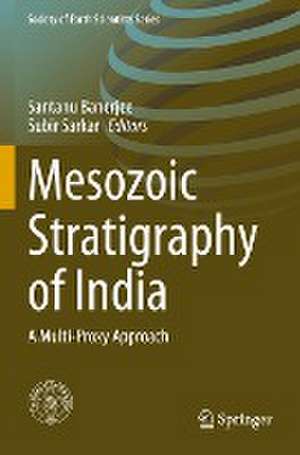Mesozoic Stratigraphy of India: A Multi-Proxy Approach: Society of Earth Scientists Series
Editat de Santanu Banerjee, Subir Sarkaren Limba Engleză Paperback – 4 aug 2022
| Toate formatele și edițiile | Preț | Express |
|---|---|---|
| Paperback (1) | 965.97 lei 6-8 săpt. | |
| Springer International Publishing – 4 aug 2022 | 965.97 lei 6-8 săpt. | |
| Hardback (1) | 972.44 lei 6-8 săpt. | |
| Springer International Publishing – 3 aug 2021 | 972.44 lei 6-8 săpt. |
Din seria Society of Earth Scientists Series
- 15%
 Preț: 696.64 lei
Preț: 696.64 lei - 15%
 Preț: 647.73 lei
Preț: 647.73 lei - 15%
 Preț: 644.49 lei
Preț: 644.49 lei - 15%
 Preț: 641.71 lei
Preț: 641.71 lei - 18%
 Preț: 946.87 lei
Preț: 946.87 lei - 18%
 Preț: 975.92 lei
Preț: 975.92 lei - 18%
 Preț: 725.92 lei
Preț: 725.92 lei - 18%
 Preț: 898.26 lei
Preț: 898.26 lei - 18%
 Preț: 973.25 lei
Preț: 973.25 lei - 18%
 Preț: 890.37 lei
Preț: 890.37 lei - 18%
 Preț: 947.85 lei
Preț: 947.85 lei - 18%
 Preț: 943.25 lei
Preț: 943.25 lei - 18%
 Preț: 726.85 lei
Preț: 726.85 lei - 18%
 Preț: 786.18 lei
Preț: 786.18 lei - 18%
 Preț: 958.88 lei
Preț: 958.88 lei - 15%
 Preț: 642.51 lei
Preț: 642.51 lei - 18%
 Preț: 951.14 lei
Preț: 951.14 lei - 18%
 Preț: 952.72 lei
Preț: 952.72 lei
Preț: 965.97 lei
Preț vechi: 1178.01 lei
-18% Nou
Puncte Express: 1449
Preț estimativ în valută:
184.86€ • 200.73$ • 155.28£
184.86€ • 200.73$ • 155.28£
Carte tipărită la comandă
Livrare economică 22 aprilie-06 mai
Preluare comenzi: 021 569.72.76
Specificații
ISBN-13: 9783030713720
ISBN-10: 3030713725
Ilustrații: XX, 727 p. 222 illus., 178 illus. in color.
Dimensiuni: 155 x 235 mm
Greutate: 1.03 kg
Ediția:1st ed. 2021
Editura: Springer International Publishing
Colecția Springer
Seria Society of Earth Scientists Series
Locul publicării:Cham, Switzerland
ISBN-10: 3030713725
Ilustrații: XX, 727 p. 222 illus., 178 illus. in color.
Dimensiuni: 155 x 235 mm
Greutate: 1.03 kg
Ediția:1st ed. 2021
Editura: Springer International Publishing
Colecția Springer
Seria Society of Earth Scientists Series
Locul publicării:Cham, Switzerland
Cuprins
Course of Events that Constrained Evolution of the Fluvial-dominated Bhuj Formation, Kutch, India on Top of Marine Shelf.- Radiation of Flora and Fauna in the Triassic Succeeding the end Permian crisis: Evidence from the Gondwana Sediments of Peninsular India.- Ichnology and Sedimentology of Mesozoic Sediments in Rajasthan.- Mineralogical and Chemical Characteristics of Bole Beds in Maharashtra.- Paleoenvironmental Implications of Mesozoic Ironstones in Kutch.
Notă biografică
Santanu Banerjee is a Professor at the Department of Earth Sciences, Indian Institute of Technology Bombay. He obtained Ph.D. degree from Jadavpur University, Kolkata, in 1997. Santanu does research in sedimentology and petroleum geology. His research areas cover sedimentary facies and basin analysis, microbially induced sedimentary structures, sequence stratigraphy, recent sedimentary environments around Gulf of Cambay for outcrop analogues of subsurface reservoirs, provenance and tectonic settings, glauconite formation in sequence stratigraphic context and Jurassic black shale in Kutch. He is the Associate Editor in Chief of the Journal of Palaeogeography. He is in the editorial board of the Arabian Journal of Geosciences, SN Applied Sciences and Journal of Earth Systems Science. He is the Vice-President of the Indian Association of Sedimentologists. He has supervised many research projects sponsored by Government agencies and oil companies. He has published more than 100 research articles in journals and edited four books.
Subir Sarkar is currently Professor in the Department of Geological Sciences, Jadavpur University, Kolkata India. He obtained his Ph.D. from Jadavpur University in 1990. He has more than 25 years of experience in teaching and about 30 years in research. Dr. Sarkar has worked in different Proterozoic basins in India and his scientific interests are in the areas of sequence stratigraphy, biosedimentology, and basin analysis. With a special interest in the record of early life, he is currently studying the influence of microbial mats on Precambrian sedimentation. He is in the editorial board of Journal of Palaeogeography. He has published more than 100 research articles in peer-reviewed national and international journals and conference proceedings. He has also published 16 book chapters and edited four books.
Subir Sarkar is currently Professor in the Department of Geological Sciences, Jadavpur University, Kolkata India. He obtained his Ph.D. from Jadavpur University in 1990. He has more than 25 years of experience in teaching and about 30 years in research. Dr. Sarkar has worked in different Proterozoic basins in India and his scientific interests are in the areas of sequence stratigraphy, biosedimentology, and basin analysis. With a special interest in the record of early life, he is currently studying the influence of microbial mats on Precambrian sedimentation. He is in the editorial board of Journal of Palaeogeography. He has published more than 100 research articles in peer-reviewed national and international journals and conference proceedings. He has also published 16 book chapters and edited four books.
Textul de pe ultima copertă
This book envisages a multi-proxy approach using stable isotopes, geochemical proxies, magnetic susceptibility and associated biotic events for paleoclimatic and paleoenvironmental interpretations of the Mesozoic sedimentary record of India. Mesozoic rocks of India record abnormal sea level rise, greenhouse climate, intensified volcanism, hypoxia in seawater, extensive black shale deposition, and hydrocarbon occurrence. The Mesozoic has also witnessed mass extinction events, evolution of dinosaurs, and breakdown of the supercontinent Pangea and the formation of Gondwana. Although the Mesozoic geology of India has witnessed significant progress in the last century, literature survey reveals a huge gap in knowledge regarding sequence stratigraphy, chemostratigraphy and key geological events. A synthesis of sedimentological, paleontological and chemical data is included to presenting a comprehensive understanding of the Indian Mesozoic record to students, researchers and professionals.
Caracteristici
Up-to-date information regarding marine and non-marine Mesozoic records of India Contain information regarding hydrocarbon resources Sedimentation during the greenhouse climate
